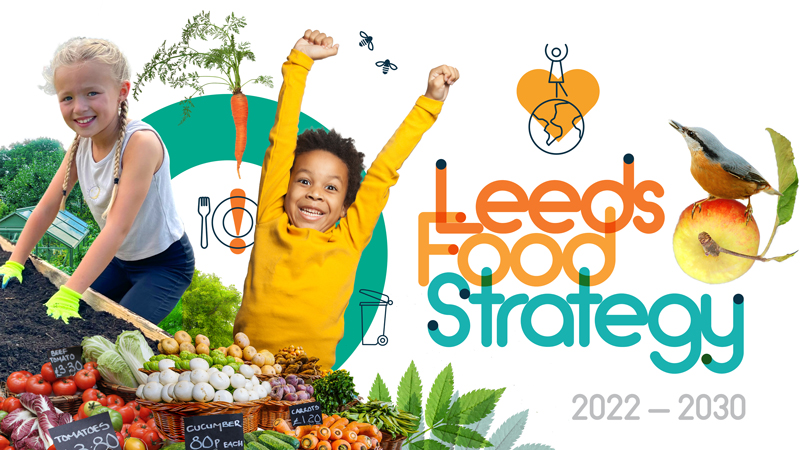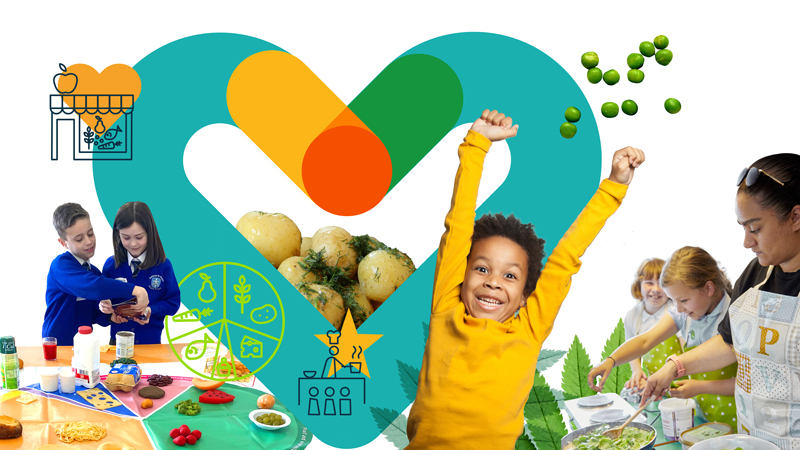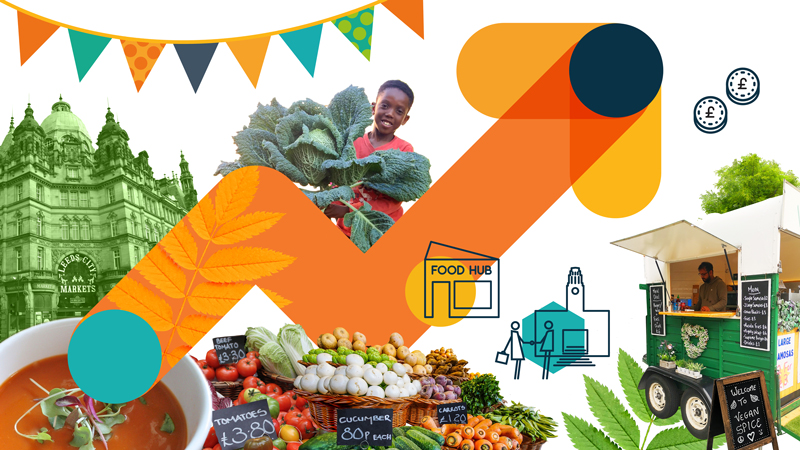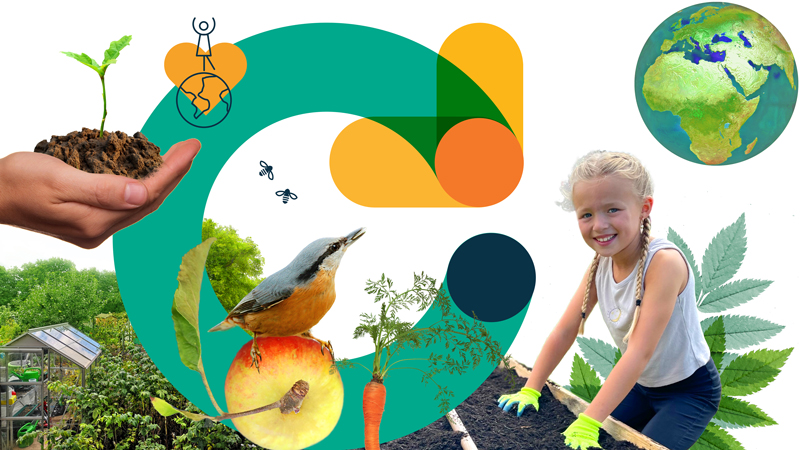At the heart of this strategy is our vision for Leeds to have a vibrant food economy where everyone can access local, healthy, and affordable food that is produced in ways that improve our natural environment and embrace new techniques and technologies.
-
About the Leeds Food Strategy
- Achieving our vision - our food missions
- Health and wellbeing
- Food security and economy
- Sustainability and resilience
- Why we need a Leeds Food Strategy
- Delivering the strategy
- How this strategy was developed
-
Get involved

About the Leeds Food Strategy
The Leeds Food Strategy sets out our vision for the future of how we produce, consume, and dispose of food across the local authority district.
This means that we believe the foods that we eat should reflect our rich and diverse culture, nourish our social connections, enhance our physical and mental well-being, and make our lives better. It means that our food system should enable people, producers, and our planet to prosper. The Leeds Food Strategy sets out what the local authority area can do to work towards this better food future for all.
We will work towards our vision by focusing on three core missions. These missions have been designed to complement our Best City Ambition, whilst also demonstrating how Leeds will work collaboratively to support the aims of the Government Food Strategy and independent National Food Strategy.
Achieving our vision - our food missions
Health and wellbeing

Helping people to improve their health and wellbeing through eating well.
Find out more about our plan around health and wellbeing.
Food security and economy

Working to give everyone in Leeds access to nutritious food as part of a diverse, inclusive and vibrant food economy.
Find out more about our plan around food security and economy.
Sustainability and resilience

Ensuring Leeds’ food system is fit for the future and supports our climate action plan.
Find out more about our plan around sustainability and resilience.
Why we need a Leeds Food Strategy
An introduction by Cllr. Abigail Marshall-Katung, Food Champion at Leeds City Council and Gareth Batty MBE FRSA, CEO at FareShare Yorkshire.
This strategy includes policies and initiatives to build on our past successes and move towards a local food system that is better for people, producers, and our planet. It’s laid out across three, mission-driven, interlinked sections that tackle each challenge in turn.
Councillor Abigail Marshall-Katung – Official Food Champion, Leeds City Council and Gareth Batty MBE FRSA – Chief Executive Officer, FareShare Yorkshire
Read the full introduction
“Wherever you go in the city, you’ll see that food is central to life in Leeds.
“Food sustains both lives and livelihoods. It nourishes and reflects our rich and diverse culture. No matter where in the world you come from, you’ll be able to enjoy a taste of home here in Leeds. Whether you’re looking for Michelin-recommended fine dining or a little-known independent gem of an eatery, Leeds has a lot of good things on the menu.
“Food plays an important role in our economy too. Thousands of Leeds businesses employ tens of thousands of local workers in the production, selling, and serving food. The city’s vibrant food sector supports our thriving visitor economy. It’s really no wonder that we’ve sometimes been called the Foodie Capital of the North.
“Yet while we have plenty to celebrate, we must acknowledge that too many people in Leeds struggle to put good food on the table. Everybody should be able to access and afford nutritious food.Nobody should ever have to choose between heating or eating, yet this is the grim reality sadly facing many people that we work with today.Across the UK, the number of people in relative poverty is increasing and has been for more than 10 years. Even before the pandemic, it is estimated that 174,000 Leeds residents lived in relative poverty. Industry data shows that food prices are inflating faster than wages and that those on the lowest incomes are being hit the hardest. Non-financial barriers (like living far away from places that sell affordable, nutritious food) also make the problems of food insecurity worse for many. Paradoxically, however, we collectively throw huge amounts of good food away - enough to almost fill one in three rubbish bins collected by the council.
“When good food is affordable and conveniently available, our health and wellbeing thrives. By helping more people in Leeds to eat a healthy, nutritious diet that aligns with the NHS recommended Eatwell guidelines, we can save lives and improve quality of life for thousands of people. And because foods that are good for us tend to be better for the planet too, doing so will accelerate our journey to become a net zero city.
“Until the causes of global warming are addressed worldwide, our climate will continue to change and impact harvests everywhere. Climate change will therefore make our economic and health challenges harder to address unless we grow and source foods in a more sustainable and resilient way. British farmers will continue to produce most of the food we eat in the future, but they must be supported as they transition to more sustainable and climate-resilient practices. Leeds City Council has pledged to, by 2030, reduce the carbon footprint of the food it sells or serves in half, and is the first local authority in the country to make any carbon related food commitments. Leeds City Council has also signed the Glasgow Food and Climate Declaration, reiterating its commitment to taking local action on food and climate.
“Local efforts are already making a real difference. Organisations like FareShare Yorkshire help: in the last year they provided more than 5 million meals across the region, preventing 2,100 tonnes of food from going to waste and helping many thousands of families. But FareShare Yorkshire is just one of many fantastic charities and community groups. Since 2017, FoodWise Leeds has brought together many of these local charities and policy makers to address some of the city’s big challenges and to pursue a better food system. Their amazing efforts, supported by the council, has already seen Leeds given the Sustainable Food Places ‘Bronze’ Award.
“All of these issues that we’ve mentioned above are challenges which this ambitious Leeds Food Strategy seeks to address. This strategy includes policies and initiatives to build on our past successes and move towards a local food system that is better for people, producers, and our planet. It’s laid out across three, mission-driven, interlinked sections that tackle each challenge in turn.
“Across the whole document, you’ll see our commitment to abide by three fundamental principles: collaboration across the city’s food system, use of local insight and evidence as the basis for solutions, and the transparent monitoring and evaluation of our work.
“We believe that the Leeds Food Strategy is a recipe for success, but we’ll need the support of the whole city to turn our ambitious vision into a reality. We hope you’ll join us.”
Cllr. Abigail Marshall-Katung | Official Food Champion (until taking up position of Lord Mayor of Leeds 2024-2025), Leeds City Council
Gareth Batty MBE FRSA | Chief Executive Officer, FareShare Yorkshire (until August 2024)
Delivering the strategy
The Leeds Food Strategy has been co-developed by Leeds City Council and FoodWise Leeds.
FoodWise Leeds formed in 2017 as the city’s food partnership to create a healthy, sustainable, and fair food system for everyone in Leeds. The partnership is made up of representatives from the third sector, academia, business, and the council.
Leeds City Council and FoodWise Leeds will work in partnership to oversee the review and development of the annual Leeds Food Action Plan that will be key to the strategy’s delivery from now until 2030. They will also share and present an update detailing the Plan’s progress every year at a public meeting of Leeds City Council.
How this strategy was developed
The Leeds Food Strategy has been co-produced with individuals and representatives from third sector organisations, business, academia, the public sector and the council to create a shared vision for putting healthy, sustainable, and fair food as central to the city’s success.
More than 70 stakeholders from the local food system gathered in 2022 to share their knowledge and collectively develop a vision for what our local food system should look like to help address some of the city’s biggest challenges. Attendees also celebrated Leeds’ many successes such as community gardens and farming initiatives, the support of community food aid projects, the vibrant independent food businesses, and the support for children and families offered through the Healthy Holidays programme.
Following this meeting, working groups were set up, each co-chaired by both an independent organisation and a council representative, to represent and develop each of the three strategic ‘missions’ of the strategy into the format you see today.
Organisations that contributed to the Leeds Food Strategy steering group include:
- FareShare Yorkshire
- Food Aid Network
- FoodWise Leeds
- Leeds City Council
- Rethink Food
- University of Leeds
The Leeds Food Strategy also incorporates the six key issues assessed as part of the Sustainable Food Places award scheme. A public consultation was held between October and December 2022 which incorporated an online questionnaire, public meetings, and face-to-face engagement. More than 90% of respondents to the questionnaire agreed with the vision and missions of the strategy.
Even though we are no longer consulting on the Leeds Food Strategy, we are always interested to hear feedback and suggestions. Further comments can be submitted by emailing LeedsFoodStrategy@leeds.gov.uk.
Get involved
We believe that the Leeds Food Strategy is a recipe for a better local food system, but we’ll need the support of communities, businesses and decision makers across the city to turn our vision into a reality. Every action counts.
Take action to make our food system better
Whether you’re a Leeds resident, a food business owner or part of a local organisation, discover easy ways to become FoodWise and take action to help us create a healthy, sustainable and fair food system for our city, that tackles social, economic and environmental issues. There’s plenty of ways for you to take action and be more FoodWise
Talk to someone about this strategy
The more people know about the Leeds Food Strategy, the bigger an impact that it can have. If you think that our approach is interesting, we’d love you to share this strategy with your friends and networks - and encourage more people to get involved.